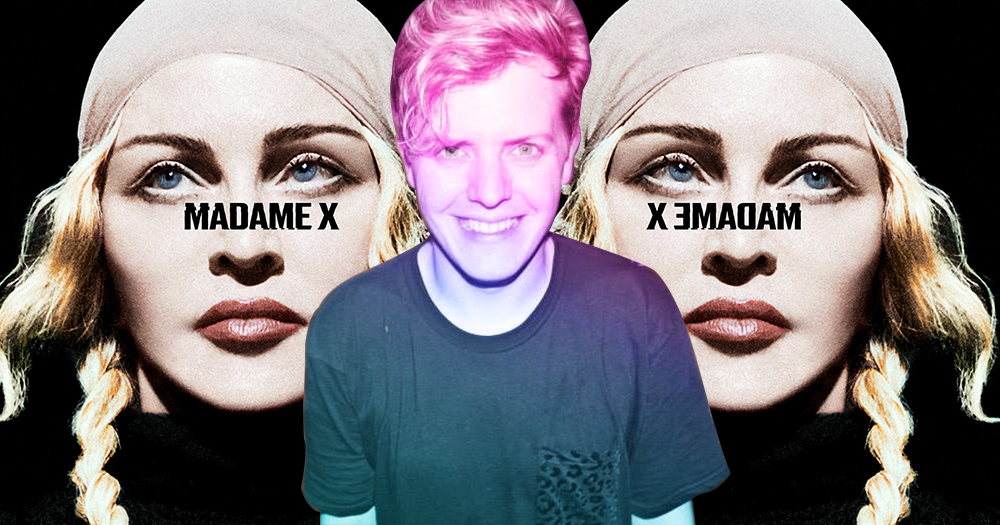Always in vogue, Madonna makes another return this June with a new album, Madame X, and, even now, still feels like a pop culture lightning rod. With a new album informed by her recent move to Lisbon there’s also the fact that every Madonna album starts conversations. Including ones about her age.
US talk shows like The View have berated Madonna for daring to dance around on stage at 60. In her Vogue UK interview, Madonna noted the ongoing ageism she faces. Given the rousing tabloid cries of “put it away” that follow any move Madonna makes on stage it’s hard to disagree with her.
Other conversations around Madonna do deserve a fair hearing though. As the LGBT+ TV series, Pose, heads into its second season, they’re preparing to tackle Madonna’s 1990 hit, ‘Vogue’, how it shed a light on queer ball culture and how she may have stolen from it. There’s no doubt that Madonna benefitted hugely from being white when taking references from a scene predominantly created by queer people of colour.
But Madonna also included dancers from the ball world in the live performances and video for ‘Vogue’. José Gutierez and Luis Camacho who choreographed the videocame directly from the ballroom world. Madonna then brought them on the Blonde Ambition Tour, the pair becoming the standout stars of the proceeding documentary Truth Or Dare. They even released a single in 1993 called ‘Queen’s English’ which featured Madonna on backing vocals (the only time she’s ever done so for another act).
But that doesn’t erase the fact that Madonna can enjoy the commercial success of applying ball culture to a hit song while those involved in the scene face discrimination and violence in their lives outside of the ball culture.
While being seen as an LGBT+ ally is standard for pop acts now, Madonna truly has put her time in. GLAAD recently presented her the Advocate For Change award. In an emotional speech, she recounted her experiences growing up with gay men like her dance teacher, Christopher Flynn, and the reality of watching the gay people in her life be ravaged by the AIDS crisis during the 1980’s.
It was a reminder of how Madonna spoke up and fundraised around these issues, both publicly and privately helping friends access medication they otherwise couldn’t, donating profits from arena shows to AIDS charities and putting safe sex literature into her album materials. The Truth Or Dare documentary was also a landmark piece for how it centred gay men and their experiences in a way pop culture so frequently didn’t at the time.
Madonna, like any enduring cultural figure, is complex. She’s a culture vulture who constantly reinvents in a way that can feel almost exploitative but she’s also someone who offered support and solace to the LGBT+ community before it was considered cool or safe to do so. At 60 years-old and still continuing her artistic journey, it’s hard to deny Madonna’s cultural impact and it’s important to understand the complicated, nuanced ways that impact is still being felt.
MUST READ: In the era of peak drag, Crystal Ramussen’s Diary Of A Drag Queen still stands out. A deeply funny and deeply insightful read, it’s a whip-smart ride through a year in the life of a drag performer and queer person trying to navigate identity, sex and the thrill of the spotlight. Few books can move between hilarious sex anecdotes, thoughtful analysis of gender and still find time to sprinkle in a reference to camp classic, Burlesque.
MUST READ: Irish writer and academic Emma Dabiri already has an impressive profile thanks to her writing and TV work. In her new book Don’t Touch My Hair she tackles the complex topic of black hair. It candidly explores her own experience growing up in a largely white Ireland of the 1980’s while also digging deep into a well-researched context and history of black hair. While it’s a weighty topic, Dabiri’s writing makes it easy to digest. A smart, brilliantly written look at an important topic.
MUST READ: Candice Carty Williams has had plenty of hype for debut novel Queenie and it’s easy to see why. Queenie is in her mid-20’s and reeling from relationship trouble, painful childhood memories and the BS a young black woman puts up with daily in London. There’s a willingness to explore a complex character that recalls TV shows like Fleabag and Insecure but Queenie has a unique POV helped by a supporting cast of characters that feel vivid and true.
Along with Holly Shortall, Conor is the co-host of Popsessed – the unmissable pop culture podcast. Check it out here.
This story originally appeared on GCN’s May 2019 issue. Read the full issue here.
© 2019 GCN (Gay Community News). All rights reserved.
Support GCN
GCN is a free, vital resource for Ireland’s LGBTQ+ community since 1988.
GCN is a trading name of National LGBT Federation CLG, a registered charity - Charity Number: 20034580.
GCN relies on the generous support of the community and allies to sustain the crucial work that we do. Producing GCN is costly, and, in an industry which has been hugely impacted by rising costs, we need your support to help sustain and grow this vital resource.
Supporting GCN for as little as €1.99 per month will help us continue our work as Ireland’s free, independent LGBTQ+ media.
